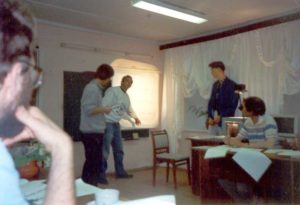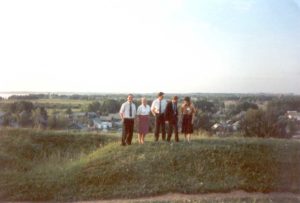The ISEE Russian Chapter, Institute of Control Sciences (ICS) and Program Systems Institute (PSI) of the Russian Academy of Sciences (RAS), and the Russian Ministry for Environment and Natural Resources organized an International Interdisciplinary Meeting on «The Role of Information Sciences in Regional Development » that was held in Moscow and Pereslavl-Zalessky (near Moscow) on July 20-24, 1993.
The Meeting was attended by more than 40 scientists and ministerial experts mostly from Russia as well as from USA, Sweden, Germany and the Netherlands, and focused mainly on the following topics:
- Application of ecological economics for regional development;
- Social, ecological, economic monitoring at the regional level;
- Integration of economically efficient scientific, educational and innovation activities at the regional level;
- The use of modeling for the integration of information processes and development of statistics standards;
- Significance of science parks for sustainable regional development;
- Priorities and stages in development of information systems at the regional level.
In his greeting to the Meeting participants Russian Minister of Environment and Natural Resources preofessor Victor Danilov-Danilian stressed the necessity of systems approach to economic, population, natural resources and ecosystems issues in order to get effective results at the regional level. Information science was viewed as an e
ffective tool for such integration. In its turn, informatics should itself become less « technocratic » and more « humanitarian », move its orientation from technosphere to biosphere. The establishment of science/technoparks and “ecopolices” in different regions of Russia was encouraged by the minister who considered them as important growth points of new, environmentally sound and sustainable socio-economic systems based on ecological economics principles, monitoring of the natural environment and socio-economic processes.

Professor Ann-Mari Jansson (Stockholm University) discussed the emergence of the ecological economics paradigm in her plenary talk and also informed the Russian participants about ISEE activities.
About twenty plenary papers were presented. Among keynote Russian academic speakers were professors N.Moiseev, I.Pranguishvilly, A.Ailamazian, F.Aleskerov, S.Dubovsky, V.Gurman, V.Burkov (on the picture from left to right), R.Perelet and others.
The final round table discussion was devoted to elaborating specific principles and practical recommendations on the basis of suggestions made during the Meeting. A Concluding Document «Trend-Setting in Systems Approach to Information Technologies for Regional Management» was adopted. In particular, it emphasized the role of the Pereslavl-Zalessky Science Park as a promising example in this field.
A separate session was also held to discuss the development of the ISEE Russian Chapter activities, including organizing different scientific events in future, broadening the ISEE/RC membership, initiating projects that would deal with the translation of foreign books in ecological economics into Russian, and other questions.
Among activities planned by ISEE/RC is also a series of expeditions to Lake Baikal and its basin aimed at attracting attention of the international community to the urgency of solving ecological and economic problems of this region which is a unique natural system of world significance. Lake Baikal is the largest fresh water reservoir on our planet. It is a gigantic natural source of highest quality fresh water, which is expected to become the most important strategic water resource in the near future. However, because of some historical, political, and cultural circumstances, the current way of life and activity of people in the Baikal area (the lake basin measures about 500.000 square kilometers and directly influences the life of the lake) exacerbate environmental problems. Two large pulp and paper mills on the Baikal shore and on the bank of its main in-flowing the Selenga river have polluted the atmosphere and water for many years despite any attempts to introduce reliable and effective environmental controls. A Government decree of 1987 urging the speediest of Baikal environmental problems has not yet been implemented. The Baikal pulp-and-paper mill continues to operate. No real measures have been taken to convert the mill into a furniture and wooden house construction factory, and to implement ecologically expedient strategy for the adjoining regional development. The administrative control-and-command system, which created the problem, has collapsed, but the mills, which pollute Baikal, remain and continue to exist as a symbol of the backwardness of this society, and of the victory of criminal technocratic mentality. However, it is clear that the shortage of economic resources for radical changes in the Baikal region (which is connected with present social- economic crisis in Russia) makes it necessary to appeal to the world community to take joint actions for the sake of saving and preserving Baikal.
In the period of July 27 – August 10, 1993 the first expedition from the series planned was held with about 20 participants from Russia, USA, Germany and Austria.
The goal of the expedition was to help speed up the solution to the Baikal problem. The concrete tasks of the expedition were:
- To assess the present-day situation at Lake Baikal and of the state of scientific studies in the area;
- To work out recommendations for governmental organizations concerning economic mechanisms for the rational environmental management, creation and further development of nature reserves and national parks;
- To make proposals about a large-scale investment program and separate projects of creating of ecologically expedient recreation centers for potential partners from both Russia and other countries;
- To plan future international expeditions to Lake Baikal and the adjoining area (its basin) both in Russia and Mongolia in order to intensify ecologically sound activity in this region.
The route of the expedition and its program excluded traditional comfortable conditions to bring the participants to the reality with all its beauties and disadvantages. Both were recorded in the expedition notes and photographs. The expedition covered the most interesting parts of the Middle and Southern Baikal, which helped to collect a lot of information which is going to become the basis for forthcoming publications.





